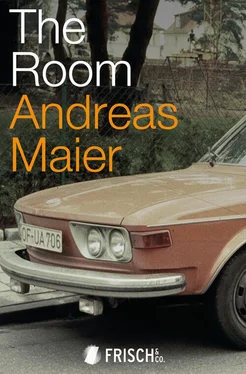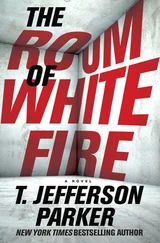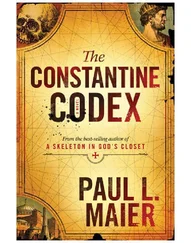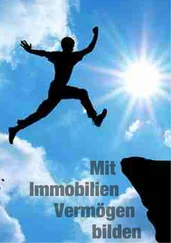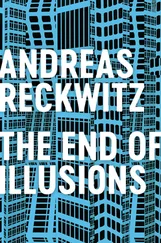My uncle is arriving back in the Wetterau now. As always when you have just passed Bad Vilbel and are heading through Dortelweil, there’s this feeling that everything has suddenly gotten a little lighter, the skies a touch more blue. This is the Wetterau Blue, suddenly there to greet you (but only the Wetterauers can see it, and it takes years, I think — I grew up there, remember). Arrival in the Wetterau. A motorway with a bypass attached. And in summer it will be twice as bright, because of the rapeseed, and then it will be the corn, growing in the fields and becoming more and more yellow, even golden by the end. Shortly before summer draws to an end, Wetterau becomes this intensely yellow landscape with an intensely blue sky above it, and remember that the towns weren’t that big back then — even Friedberg was only half as big when they were driving around on the moon, something that couldn’t be seen with the naked eye, merely imagined: Up there, at this very moment, they’re driving around in a buggy, then they’ll leave it there and fly off again, discarding the entire rocket, then fly forevermore through the universe and further and further away from the Earth and the Wetterau, which can’t be seen on any of the photos of the blue planet, they would need to be much closer for that. It’s only at the foothills of Taunus that it starts to become green again, where the forest begins, my uncle’s heartland. It’s now the brightest moment of the day outside, the tractors are being driven across the field, and of course my uncle only has eyes for them. He sees a particularly big tractor with three farmers standing around it (another one is in the process of driving a trailer away), but now the train has passed the field already, so my uncle has to crane his neck to be able to keep the big agricultural engine in his sights, and before long it’s gone. Scale models of these engines used to be in all the toy stores, for practice, a Fendt, a John Deere. You could play at being a Wetterau farmer with these toys at any time, even once the days when there was a chance you would actually have become a Wetterau farmer were long gone. You could use the little toy combine harvester (although for a child it seems huge, as big as a house) to mow over the grass in your front garden and imagine that the corn was shooting out of the duct at the top, straight down into the trailer. There would be a model trailer in the front garden too. And a tractor. Perhaps with a plough fixed onto the back, which in actual fact is pretty pointless because the tractor is supposed to drive the trailer onto the field to fetch the corn, not pick it, but when you’re a child you always want to do everything at the same time, so all the technology has to be attached to one and the same tractor if possible, making it into a Super Tractor, and preferably including the immense Weed Extermination Spraying Machine too. Sometimes they could even fly, these tractors. Before model aeroplanes reached the Wetterau on a mass scale, model tractors had to serve for flying purposes, at times even with the trailer attached, and the spraying machine too (which is ten or twelve metres wide, and even wider still as a toy model — the spraying machine alone practically looks like an aeroplane in its own right). And of course there are a growing number of little matchbox cars alongside these in the front garden, because driving was getting more important, even for children, and would soon replace everything else, in the Wetterau and beyond, long before the first bypass came. Even toy guns (“Bang bang, you’re dead!”) would be left lying around once model cars arrived. Soon everyone was driving, even in make-believe. In my childhood, before there was a bypass, Wetterau kids would sit around at home practicing for the future with model car racing tracks with double loops, to see who was quicker; we were already competing on the streets even in our own bedrooms, and today they’re all driving for real, and in a few weeks it will be finished, the bypass. But for now it’s still 1969, and my uncle is on the train. A small plane is flying up above, possibly en route from the former airfield in Ockstadt. That was another one of my uncle’s favourite places, the airfield with its viewing platform and adjoining beer hut, once the gliding club had moved from Ockstadt to the edge of the Bad Nauheim forest behind Johannisberg. You can run around between the covered and uncovered aeroplanes for as long as you want there, you can even touch them. The only thing my uncle can’t do is fly them, but at least he can admire the people who do. Or the way they drink a beer afterwards and tell their stories. There are lots of gliders in Bad Nauheim, from all over the region. There’s this special process whereby they get pulled up by a machine, connected to a cord that is then decoupled, and my uncle can happily watch it for hours on end, a manoeuvre in the air, collaborative, practiced to perfection. You stand or sit and wait for both engines to start, your concentration intensifying, sheer suspense once both of them are in the air, and then comes the moment when the cord is released, and the excitement gets released too, for everything has gone to plan, and the glider glides away to who knows where, maybe to the Palatinate, maybe to Thüringen or even to France. Power gliders don’t do this manoeuvre with the two planes, they ascend on their own steam instead, which isn’t really as interesting, but then again they have engines of their own and are practically aeroplanes anyway. J admires them because they have propellers, almost like a Messerschmidt from the war, or a Focke-Wulf. And so the little aeroplane flies towards my uncle and greets him, my uncle in the train from Frankfurt to Bad Nauheim. Has he ever flown in his life? I doubt it. He probably wasn’t granted that particular joy. I don’t know if he ever even saw the airport in Frankfurt, but if he did it would have been a big day for him, without a doubt. His mother never travelled by plane. Where would she have flown to? The only journeys she ever made in her life were to Freiberg, to see her sister and Aunt Lenchen. And she always went by train, without J. So it’s likely that my uncle never got to see the airport. But maybe he did, maybe they trekked back and forth out of pity because he was so desperate to go to the airport’s viewing platform, where you could see the jets taking off and landing and driving around, the big planes, the biggest of all. So there they stand on the viewing platform, a Boll day out with the son-in-law and the entire family in tow, as was the norm back then, and J was happy and buying postcards of the aeroplanes as a reminder of their wonderful day — look, the Boeing 737! In actual fact, it’s impossible to imagine that my uncle wasn’t aware of the existence of these planes. (The Boeing 747 didn’t exist back then. It wasn’t introduced until 1969, immediately becoming the favourite of all scale-model-enthusiast kids, and of humanity in general.)
And now the small aeroplane is gone too, and the train is approaching Karben, and Wöllstadt, and making its way on and on with my uncle in it, my uncle who won’t go to the airport today, nor see the big airliners, nor watch the transmission of the current moon landing flight, but he’s looking forward to what’s to come regardless, his time-off and the forest and the beer, and perhaps to eating something hearty later on, after his early dinner at home with his mother. Supper at the inn to round off the day. In Wöllstadt, a police car with its blue lights flashing drives past the window of the train (which is rolling slowly over a level crossing). My uncle observes all of this very closely, noting that everything has its importance and its function and is the way it is supposed to be: the train tracks, the signal at the crossing, the police car, he observes it all and pays attention to everything, in much the same way as others might gaze at a model railway, where everything has its particular significance, where everything you see is part of a plan and is the way it is supposed to be and always stays in order. Two trains could collide head-on there and no one would die. This is how my uncle travels through the Wetterau, as if it was his very own model railway world, and he doesn’t even need the model because for him the original itself is a model, and the same goes for the police car and its flashing blue lights. It’s one of those details that there is a great deal of effort behind — it doesn’t have to be there after all, the police car (with the flashing lights as a special feature), but it is, as if it had been especially selected from a catalogue (Fleischmann? Märklin?). And my uncle says to himself that it’s a very good thing it’s there, driving along outside right now. As if it was doing it just to please him. A world which is complete. With many details to be marveled at, all of them lovingly prepared, just like the way my uncle files his screws in the cellar, lovingly, with great care. Even the pistols in the policemen’s holsters (with small plates showing the brand name and exact cartridges to boot), and the holsters themselves are interesting details, worthy of observation and close study. J would have loved to have a holster like that, even just the holster by itself. He would have practically been a policeman with that holster. Perhaps that’s how it was: perhaps, for my uncle, being in the world was like standing in front of a big model railway. He must have spent most of his time living in an idyll. My uncle’s idyll, the kind that could only have existed in his forceps head. A few years later, my brother made a big model railway down in our basement, almost the whole of the Wetterau to scale. My uncle, on the other hand, stood before reality like a child even as an adult. As soon as he saw a police car with the flashing blue lights on, he would get all worked up. For him, the police must have represented a display of splendour, like the army, like the Wehrmacht, like the military parades he watched with such excitement on TV, where everything was about uniform and parade dress, cavalry and tank displays and the like, the monopoly of flashing lights. It probably didn’t even occur to my uncle to question where they were on their way to, the policemen there in Wöllstadt, because the only important thing was that they were driving and that they were policemen and that they had turned on the flashing lights, and this in itself made the world good and wonderful. My uncle, as I picture it (and I can’t picture it any other way, for I later experienced this with him many times), sees the police, and all is well with the world.
Читать дальше
